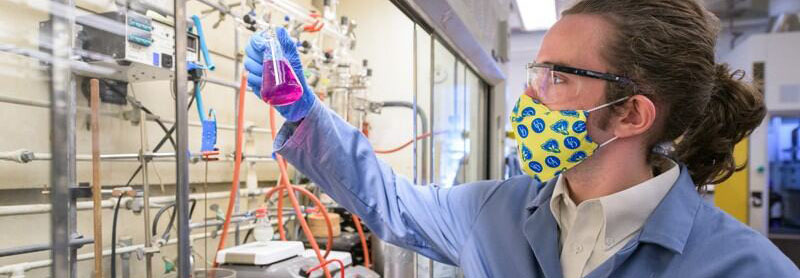
MChE
The faculty member supervising the thesis research will act as an advisor for students in the thesis option. The Department’s graduate student advisor will act as an advisor to all students in the course work option.
General Admissions Requirements
- Students must satisfy the general graduate admission requirements of the College of Engineering but satisfaction of these minimum requirements in no way guarantees admission.
- A baccalaureate degree in the field or in a closely allied field of science or mathematics.
- A minimum undergraduate grade-point average in engineering, science, and mathematics courses of 3.0 on a 4.0 scale.
- A minimum of three letters of strong support from former teachers or supervisors.
- For Chemical and Biomolecular Engineering applicants, the scholastic index of 3.0 in the major field is computed from the previous undergraduate work.
We encourage candidates with research experience (undergraduate as well as industrial), as well as those with practical industrial experience after the baccalaureate degree to apply.
Fee waiver requests
We welcome applicants from diverse backgrounds to our program, including those from groups traditionally underrepresented in STEM and in research areas of great national need. To eliminate potential barriers to applying, requests for waiving the graduate application fee for domestic applicants can be sent to cyounce@udel.edu.
- The email should include i) a brief statement about research interests, ii) rationale for fee waiver request, and iii) a copy of CV including GPA.
- Requests for fee waivers will receive a response within 10 business days; inquiries about original fee waiver request should not be sent until after this period of time has elapsed.
- UD offices will be closed December 23, 2021 – January 2, 2022 and fee waiver requests received during this time will not receive a response until January 7, 2022 or after.
- We are not able to offer fee waivers for international applicants at this time.
Course Requirements
There are five (5) components to the course requirements:
1. Chemical and biomolecular engineering science core 12 credits to be taken during the first year prior to the qualifying exams
● CHEG807 Modeling, Analysis, and Acquisition of Data (2 credits)
● CHEG810 Molecular Thermodynamics (2 credits)
● CHEG820 Kinetic Processes (2 credits)
● CHEG821 Diffusive Transport Processes (2 credits)
● CHEG802 Introduction to Data and Systems Analysis (2 credits) OR CHEG811 Chemical Interfaces and Surfaces (2 credits)
● CHEG803 Advanced Scientific Communication (2 credits, Spring Semester)
2. Chemical and biomolecular engineering seminar
One credit to be taken during the first year prior to the qualifying exams; One credit to be taken during the fifth semester of study
● CHEG 800 Chemical and Biomolecular Engineering Seminar (1 credit, taken twice)
3. Chemical and biomolecular engineering without concentration
Any combination of two 2-credit modules of advanced chemical engineering coursework not otherwise counted toward the student’s core course requirements. These credits must be taken during the first year prior to the qualifying exams.
4. Chemical and biomolecular engineering concentrations
Four (4) credits to be taken during the first year prior to the qualifying exams
Biomolecular Concentration
CHEG 840 Rate Processes & Dynamics for Microbial Systems (2 credits)
CHEG 843 Rate Processes & Dynamics for Mammalian Cellular Systems (2 credits)
Catalysis and Energy Concentration
CHEG 850 Electrochemical Processes (2 credits)
CHEG 851 Applied Thermodynamics (2 credits)
Data and Systems Concentration
CHEG 860 Process Systems Engineering: Mathematical Modeling and Optimization Principles (2 credits)
CHEG 861 Data Science for Chemical and Biomolecular Engineering (2 credits)
Soft Matter Concentration
CHEG 830 Continuum Transport in Materials (2 credits)
CHEG 832 Soft Materials, Colloids, and Polymers (2 credits)
After enrollment, students may opt to declare a concentration or they may opt to obtain the degree without a concentration. In either case, students must fulfill all stated curricular requirements. To declare a concentration, students must complete a change of major form through the Graduate College.
A concentration may be declared at any time prior to graduation.
5. Chemical and biomolecular engineering technical electives
Seven credits of chemical engineering electives are required. At least three of these credits must be at the 800-level; the remainder may be at the 600- or 800-level, with the possibility of substituting suitable courses from outside chemical engineering. The chemical engineering technical electives may be started during the fall semester of the first year and are usually completed during the second year.
CLICK HERE to view a sample of a typical first year schedule.
